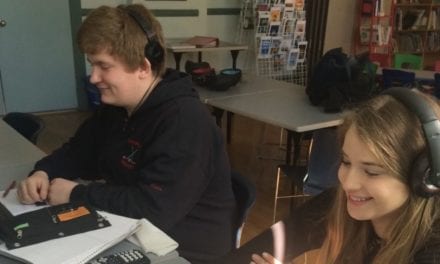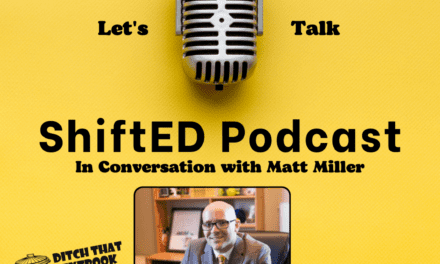It was our last class together as senior seminar students with Dr. Anderson. For most of us, the moment represented the penultimate step in completing a rather lengthy graduate degree and…we were elated. Together, we shared virtual eggnog and recounted stories of how our families traditionally celebrated the holidays. A number of students were located in Eastern Canada, a few on the West Coast, one in the Bahamas and another in Dubai. We were teachers, administrators, two emergency room doctors, a nurse, a web developer and an instructional designer. During the previous three months, once a week, we had all come together at the same time, to explore the then current trends in distance education.
On this particular night, I remember Dr. Anderson cheekily asking us to fess up and tell him what we really did while we participated in his class. He knew that we weren’t always sitting there, glued to our computers, pen and paper in hand, waiting for an epiphany. For nearly five years of my life, I had spent what could have been my daily downtime chillin’ in front of the TV or zoned out with a good book, revved up and thinking about distance ed practice and pedagogy. And yes, I’ll admit it now, sequestered in my basement office, I sometimes had one ear on a baby monitor, a stack of laundry at my elbow, and was often sporting my flannel jammies! Nonetheless, I was still able to actively engage with the process, the people and the content.
I am an online learning convert, but why do I love it so much? Well, there are some pretty obvious benefits to learning at a distance (beyond the accepted garb!) that have been widely discussed. Here are the ones that I can relate to with the most enthusiasm:
Learning online provides freedom and flexibility. The notion of anytime, anywhere learning is pretty intoxicating for somebody who loves to discover new stuff all of the time, or wants to master what he or she already knows. You don’t have to travel farther than the nearest laptop to be able to actively participate in an online session with master teachers and a group of diverse and invested peers. For me, the ability to maintain a busy professional and personal life while pursuing graduate studies, without the hassle and expense of travelling to the nearest urban centre, is liberating. Also, with the myriad of available platforms that support both asynchronous and synchronous collaboration, the task of scheduling group work, organizing follow-up sessions, and even attending an impromptu meeting becomes much less cumbersome.
Learning online enables community building on a large scale. I love meeting people who share my professional interests, in the hopes of both learning with them and from them. What better way to open up a community to as many stakeholders as possible than via the net? During my years at Athabasca University, I met people from all over the world, and together we supported each other’s learning and created some pretty cool content that I can still readily access. Of course, sustaining communities of practice or professional learning communities is yet another challenge, but one that is again potentially less difficult to overcome without the constraints of having to be physically present somewhere.
Learning online encourages accountability. This means a couple of different things to me. Online learning helped me be accountable to myself in terms of taking ownership of my learning and development as a professional…in a province where no formal requirement is made of teachers to upgrade either skill set or knowledge base. Being accountable as a student in an online setting is another aspect. It’s really hard to hide in an online class with only a dozen or so participants. Individual participation is easily noted, and it can also be quite obvious when someone doesn’t come prepared or isn’t really “there”.
As much as I appreciate the many benefits of online learning, I acknowledge that in order for online PD to be embraced by more teachers and school boards, it has to be effective, and not just in terms cost savings. So, the question you may be asking is what does GOOD online PD look like? Well…it should probably look like GOOD traditional PD! It should meet the needs of the individual, positively impact on practice, and ultimately improve student outcomes. But how? The research literature in the field suggests that high-quality PD has to:
- be content/subject-matter focused with an understanding of student learning needs
- provide opportunities for active learning around authentic tasks
- encourage collaboration
- occur over time
- allow for feedback and follow-up
- be supported in order to allow for continued growth and change
Now, all we have to do is figure out how to meet all of these benchmarks, using the best-suited technology at our disposal. What does THAT look like? Is it a blend of both online and offline learning experiences? I strongly suspect that it is, but what’s the magic combination?
This year, LEARN is offering a series of web events which we hope will respond to a need from within the milieu. We aim to target a different topic or practice each month, across curricula and communities. To me, these initial monthly online sessions are only the very beginning of a grand experiment in which we will collectively discover a model that might help us to systematically implement meaningful PD for our educators. And, we invite you to please join us as we engage, explore and exchange.
I’ll make sure to keep you posted!
Kristine Thibeault
For more information on LEARN Web Events, click here.





It was very uplifting to read an admired colleague’s comments about “learning from a distance” and the impact these opportunities for lifelong learning have had on her. I am also a confirmed believer in alternate ways of accessing information on the go. Our busy lives oblige us to embrace these opportunities not only to improve our present status as educators but also to give us the opportunity to enjoy the experience of learning new information within the comfort of our personal environment. I have been involved in e-learning for 12 years and each day I am inspired by the opportunities the teachers at LEARN provide for their students. Someone who wishes to embrace this type of lifelong learning has to be prepared for change in order to use the technology involved. However these are minor compared to what can be learned in so many different ways in the online environment within an online community. Thank you Kristine, for a great blog that really brings the reality of e-learning into perspective.
Thanks Maggie. Our online teachers and students at LEARN are certainly proof of the positive impact and opportunities that blended learning can provide.
Thank you for this! You never know when something that you share will have an impact. You have changed me tonight. I consider myself a life-long learner, and have always loved school. Now that my children are beginning to get older (5 and 7) I’ve been thinking about pursuing my education once again. But I am really not interested in going to the city to accomplish this. I knew that there were online courses available out there but haven’t really taken the time to inform myself. You have given me a starting point by sharing this blog post tonight.
Thank you again
Susan Chiasson
kindergarten teacher
Wow, thanks for sharing this Susan! The options and programs for online learners have really blossomed since I started at AU…some twelve years ago. I wish you all the best.
Thank you Kristine! It is interesting for me to hear about what you all were doing at AU before I was even thinking about online courses. I will say though that about 10 years ago I was a T.A. in a course that was given by Lynn Butler-Kisber and Jean Clandinin where we met through videoconferencing and blogged each week. We didn’t call it blogging then but we had to respond to readings and build on each other’s comments. We were discouraged from sharing our own thoughts without trying, where possible, to weave them into the conversation. This guidance came about after a few disjointed conversations, and probably wouldn’t have been needed had we met in the flesh. We hadn’t really figured out how to do things yet. We had to move the class down to another building on campus too, as the Ed. building didn’t have the needed technology at the time to enable a live a Pan-Canadian class.
What I have noticed is my own evolution with all of this. This morning for example, I decided against driving into town to hear a speaker that interests me. While I like the face to face aspect of speakers I decided that I could see a podcast online and get what I needed that way. Of course this is not new, but it is a new habit for me. Another new habit is reading online. I remember saying a few years ago, and hearing it too, that for “real in-depth reading” a printed copy was preferred. I don’t hear that so much any more, and I have moved away from that feeling myself.
Mary, on Online PD or What I’ve Learned With My Cat